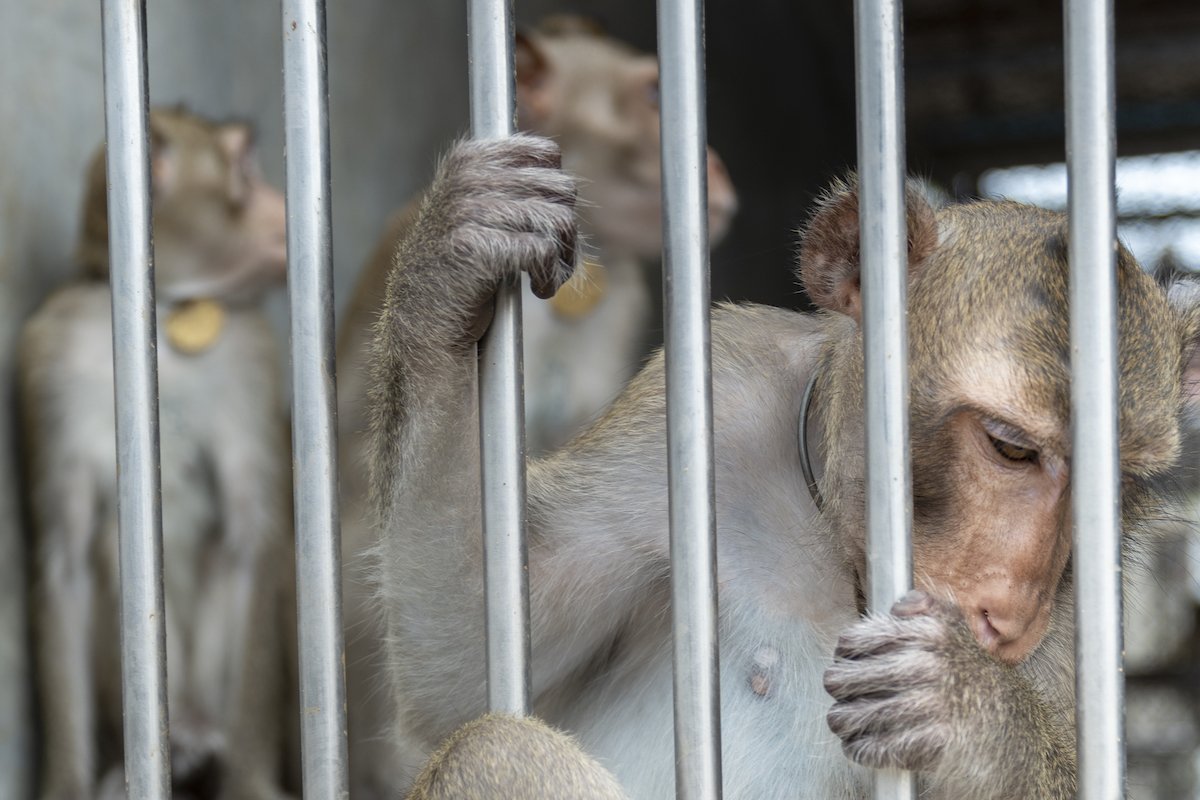“Blood on its hands again”: US research facility where 43 monkeys escaped earlier this month is now accused of killing 18 other monkeys after a heater malfunctioned
The case has renewed anger over public money being used to fund monkey experiments, with the accused US facility receiving $19 million this year alone from National Institutes of Health contracts.
A long-tailed macaque at a breeding facility. Image supplied to Species Unite
A US primate facility that made headlines worldwide after 43 monkeys escaped earlier this month has now been accused of unintentionally killing 18 other monkeys in an incident just last week.
The Yemassee Primate Center in South Carolina breeds and sells thousands of primates each year to be used in animal experiments across the country.
The facility is run by Alpha Genesis, a company which has received at least $65 million in contracts from the National Institutes of Health since 2010.
The secretive facility was thrust into the global spotlight earlier this month after the local police department announced that they were dealing with the escape of 43 rhesus macaques from Alpha Genesis.
"Every couple of years we'll have one or two that get out. We have never had this many get out”, Alpha Genesis CEO Greg Westergaard told CBS News following this month’s escape.
While the majority of the animals have now been returned to the facility, as of publication four escaped monkeys still remain on the loose weeks after the initial escape on November 7.
Now, the facility is at the center of another controversy after credible whistleblower reports allege that 18 endangered long-tailed macaques died in an incident on November 22.
The animals are reported to have died after a diesel heater may have malfunctioned.
In a statement, a spokesperson for People for the Ethical Treatment of Animals (PETA) said “Alpha Genesis has blood on its hands again”, and labelled the deaths a result of “sheer negligence”.
“There were no alarms, no alerts, as 18 long-tailed macaques likely endured agonizing deaths—either slowly roasted alive or suffocated by deadly carbon dioxide fumes,” said Dr. Lisa Jones-Engel, PETA’s primate scientist.
The animal rights group says that it has filed a complaint with the United States Department of Agriculture (USDA), calling on the agency to investigate the incident.
“I can confirm that we recently received a complaint with some detailed allegations and that we are reviewing them to determine whether there are Animal Welfare Act (AWA) noncompliances we need to follow up on,” a spokesperson for USDA told local news.
Following the latest incident, PETA has also renewed its call for the National Institutes of Health to cut its multi-million dollar funding to Alpha Genesis.
The escape had already brought public attention to the US’ hidden monkey experimentation industry. Concerns have been particularly directed at the animal cruelty involved in testing on primates, as well as the public funding of such facilities.
File photo of an animal testing facility. Credit: PETA
Local congresswoman Nancy Mace was among those critical of the facility, and sent a letter to the USDA and NIH to demand an inquiry into the escape.
“For years, Alpha Genesis has racked up federal contracts and taxpayer dollars while consistently violating animal welfare laws and exposing the public to dangerous escapes,” the congresswoman wrote in the letter.
Alpha Genesis has already faced years-long criticism for its mistreatment of animals. The company has a history of monkey escapes and gruesome deaths from neglect and incompetence, including a USDA report from 2022 that gave the facility eight violations.
The latest controversies around Alpha Genesis and the wider monkey experimentation industry has also added pressure to controversial plans to build the country’s biggest monkey farm in a small city in Georgia.
Learn more: “How did a small city become involved in plans for the largest monkey farm in the US?”.
We Have A Favor To Ask…
Species Unite amplifies well-researched solutions to some of the most abusive animal industries operating today.
At this crucial moment, with worldwide momentum for change building, it’s vital we share these animal-free solutions with the world - and we need your help.
We’re a nonprofit, and so to keep sharing these solutions, we’re relying on you - with your support, we can continue our essential work in growing a powerful community of animal advocates this year.






